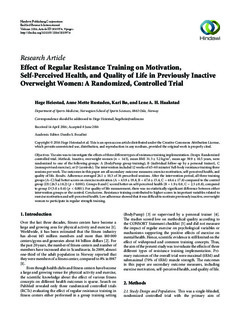Effect of regular resistance training on motivation, self-perceived health, and quality of life in previously inactive overweight women: a randomized, controlled trial
Journal article, Peer reviewed

View/
Date
2016-06-08Metadata
Show full item recordCollections
- Artikler / Articles [2119]
Abstract
The aim was to investigate the effects of three different types of resistance training implementation. Design. Randomized controlled trial. Methods. Inactive, overweight women (), mean BMI kg/m2, mean age years, were randomized to one of the following groups: A (BodyPump group training), B (individual follow-up by a personal trainer), C (nonsupervised exercise), or D (controls). The intervention included 12 weeks of 45–60 minutes’ full-body resistance training three sessions per week. The outcomes in this paper are all secondary outcome measures: exercise motivation, self-perceived health, and quality of life. Results. Adherence averaged of 36 prescribed sessions. After the intervention period, all three training groups (A–C) had better scores on exercise motivation (, , ) compared to the control group (D) () (). Groups B and C scored better on self-perceived health (, ), compared to group D () (). For quality of life measurement, there was no statistically significant difference between either intervention groups or the control. Conclusions. Resistance training contributed to higher scores in important variables related to exercise motivation and self-perceived health. Low adherence showed that it was difficult to motivate previously inactive, overweight women to participate in regular strength training.
Description
© 2016 The Author(s). This is an Open Access article.